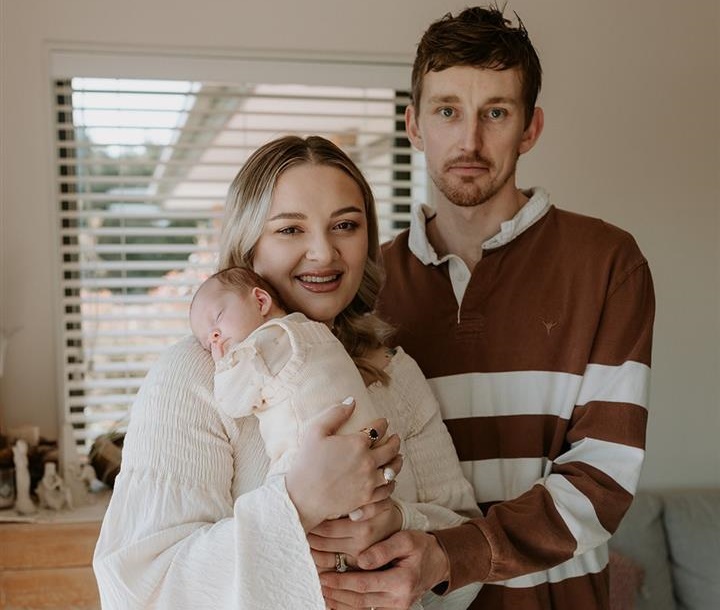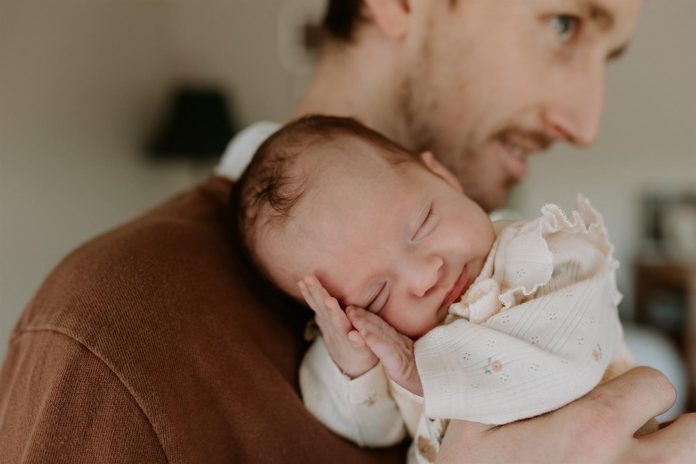
Aleisha McLay of Rakaia and her baby Violet are lucky to be alive, after pregnancy and post-natal complications almost killed mother and baby. The 28-year-old spoke to Susan Sandys as Violet arrived home after 11 weeks in neonatal intensive care.
Aleisha and Nic McLay of Rakaia were looking forward to bringing their first child into the world, a daughter, with a due date of October 12.
But a routine doctor’s visit for Aleisha on July 10, at 1pm, showed her blood pressure was dangerously high, at 160/90.
She was admitted to Christchurch Women’s Hospital, where tests showed she also had a high count of protein in her urine.
Aleisha was diagnosed with pre-eclampsia.
The condition can be dangerous for mothers, who are at increased risk for kidney, liver and brain damage, and babies, who are at risk of not developing properly as they receive inadequate oxygen and nutrients in the womb.
Aleisha had overall to date had a difficult pregnancy, suffering an early haemorrhage and around-theclock nausea and vomiting. But recently things had been going well, and the preeclampsia diagnosis came as a shock.
On the day she went to the doctor’s appointment she had felt ‘‘pretty much fine’’.
‘‘I just had a bit of a headache, but I often have headaches,’’ she said.
In hospital it was found Aleisha’s pre-eclampsia was so severe, that her baby could have to be delivered by emergency Caesarean in order to save both her life and that of the baby.
‘‘In the middle of the night at 3am they burst through the curtains and said ‘We need to give you steroid shots because we will be delivering her in 24 hours’,’’ Aleisha recalled.
The steroid shots were to help develop the baby’s lungs, giving her a greater chance of post-natal survival.
It had only been 14 hours since that routine doctor’s appointment, now Aleisha and her unborn baby were in a life or death situation.
Later that day, at 3.30pm, Aleisha was on a Flying Doctor fixed wing aircraft to Dunedin Hospital, as Christchurch Women’s Hospital’s Neonatal Intensive Care Unit was full. On the flight her preeclampsia worsened; she was vomiting blood and was finding it hard to breathe due to fluid on her lungs.
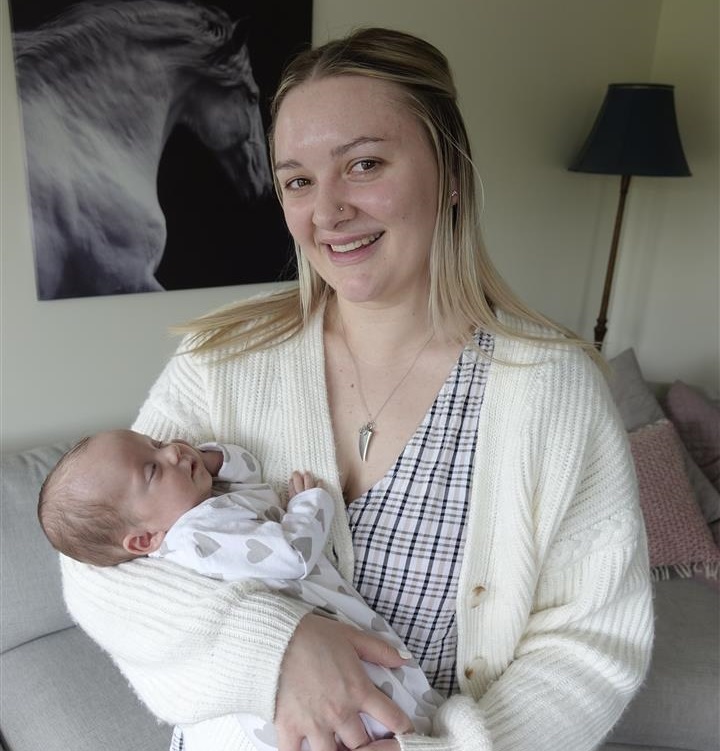
However, once in Dunedin her condition stabilised, and it was deemed Violet would not need to be delivered immediately.
Aleisha settled into hospital and waited for Nic to arrive, who was driving down to Dunedin with both her mum Sonita and his mum Gina.
Other family members arrived later.
As happy as Aleisha was to have family with her, she had to face the reality her health was continuing to deteriorate as the pre-eclampsia worsened. Her blood pressure soared, her kidney and liver function worsened. She put on 30 kilograms due to fluid retention, a common symptom of pre-eclampsia. The fluid was in her lungs, affecting her breathing, and throughout her whole body.
‘‘I couldn’t look in the mirror, because I couldn’t really get out of bed. Mum and dad described it to me, I looked as though I would have weighed 100kg, I didn’t even look pregnant anymore.
‘‘I didn’t know this could happen to you,’’ she said.
Aleisha’s life became a precarious balancing act, where she had to pit the risk of worsening pre-eclampsia against the risk to her baby of being delivered too early.
She knew her pregnancy was making her seriously ill, but needed to hold out as long as she could.
Babies born 27 weeks face months in neonatal care and have a one in 10 chance of dying, with this risk reducing for every extra day spent in the womb.
‘‘Our goal became each new day, as every one day in my tummy was worth three in the NICU,’’ Aleisha said.
‘‘I was trying to keep her in for longer, because I wanted her to keep growing. Each day I was trying to get to the next day.’’
After five days in Dunedin it was time for the emergency Caesarean, with Aleisha and the doctors coming to the same conclusion delivery had to be that day.
‘‘I decided that morning, because I was so uncomfortable and not breathing properly, I said to my sister Melissa when I woke up ‘I think we are going to have to have her today’.’’
It ended up being the right choice, as by the time medical staff were preparing her for delivery one hour later, Aleisha had developed eclampsia. Eclampsia is a life-threatening condition where the mother loses consciousness and has seizures. If the baby is not delivered the mother and/or the baby can die. It is rare, occurring in less than 3 per cent of women with pre-eclampsia.
Aleisha lost her sight, had a severe headache, was vomiting, while her hands, feet and legs were jumpy and shaking.
‘‘I walked into the prep room, but was soon too unwell to hold my head up.’’
Medical staff decided not to put her under a general anaesthetic for the Caesarean, as they were concerned the amount of fluid on her lungs would prevent her regaining consciousness.
She was given a spinal block, which meant she would feel everything that was happening, but without pain.
‘‘Nic was changed into scrubs, and we were in the operating room and Violet’s birth began.’’
Doctors performed a vertical Caesarean section.
Violet was delivered at 9.05am in her bag of waters, weighing 950g.
‘‘Her bag of waters was broken and her cord clamping was delayed two minutes, as she was breathing on her own. We heard her cry when she took her first breath, our tiny trooper,’’ Aleisha said.
It was July 16, a day that was such a special one as the birthday of their first-born, but also a day that Aleisha almost lost her life.
After she heard the reassuring sound of her daughter’s cry, she immediately lost consciousness.
She was rushed to intensive care where she spent the next 48 hours.
‘‘I was unable to meet my Violet. But her dad spent every waking moment by her side and even introduced her to her grandparents,’’ she said.
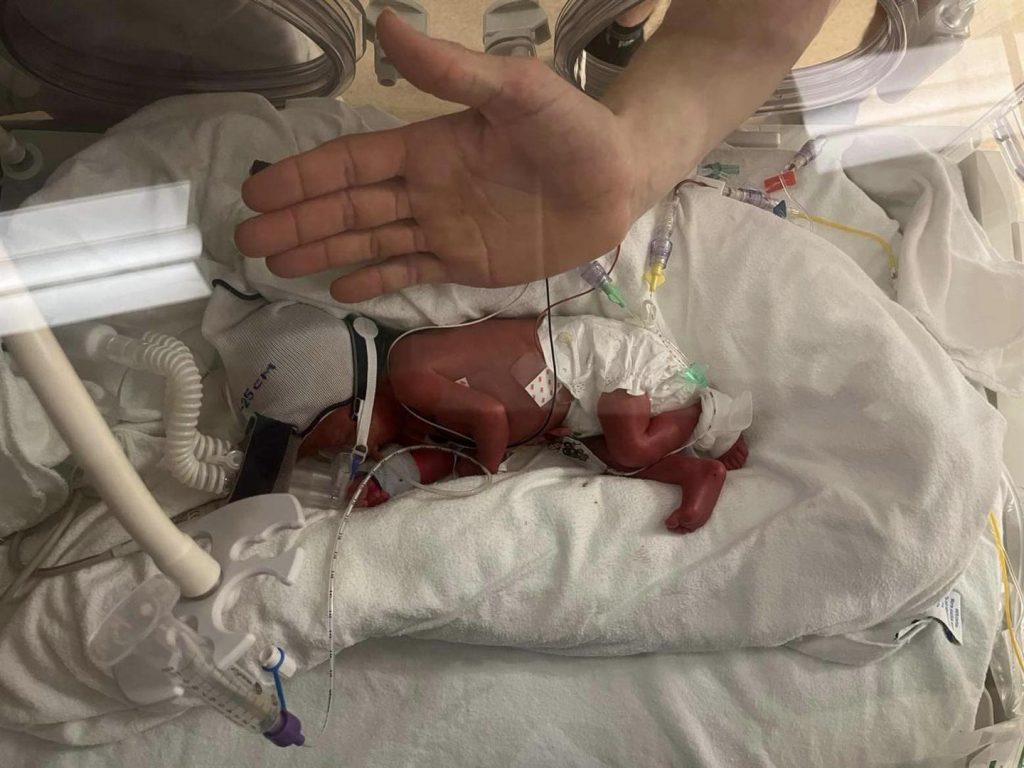
Aleisha was able to temporarily leave ICU when Violet was two-days-old, to get her first glimpse of her daughter.
‘‘Though I couldn’t see her face, just held her hand due to being in a wheelchair, her dad showed me what to do.’’
But while Aleisha’s life and death battle was over, Violet’s was not, and the tiny baby was soon in a dire situation.
Later that same day, results from an ultrasound showed there was air in her abdomen. This indicated she had a perforated bowel, something that can happen due to stress in very premature babies.
This meant Violet would need to be airlifted to Christchurch Hospital for emergency surgery.
‘‘This was extremely stressful for all of us, and meant we would ultimately be separated as a family once again, but with Violet on the outside this time.’’
Violet was prepped for travel, but when she was moved into the travel incubator a minor condition with her lung, which had been detected earlier, became worse. The trip was delayed.
‘‘We weren’t sure if she would still be able to fly, but at midnight they made the call that she would be safe to fly, with provisos. They made a plan to fly extremely low over the coastline to keep the cabin pressure at a safe level for Violet, meaning the trip would subsequently take an hour longer to accommodate.’’
Aleisha remained behind in Dunedin, fearing for her baby over ‘‘the longest night of my life’’.
‘‘When the plane touched down, Violet was greeted with a team of paediatric surgeons who immediately got to it. The operation went for two hours. I was phoned by the surgeon when it was completed to let me know it went well and Violet was stable. What a little fighter!’’ she said.
‘‘Fortunately the next day at 11.30am they made the decision to allow me to fly up there and be with our baby. I was checked into Christchurch Hospital and was allowed to make my way down to see Violet where I got to see her beautiful face for the first time ever!’’
Aleisha got to first cuddle Violet when she was six-days-old.
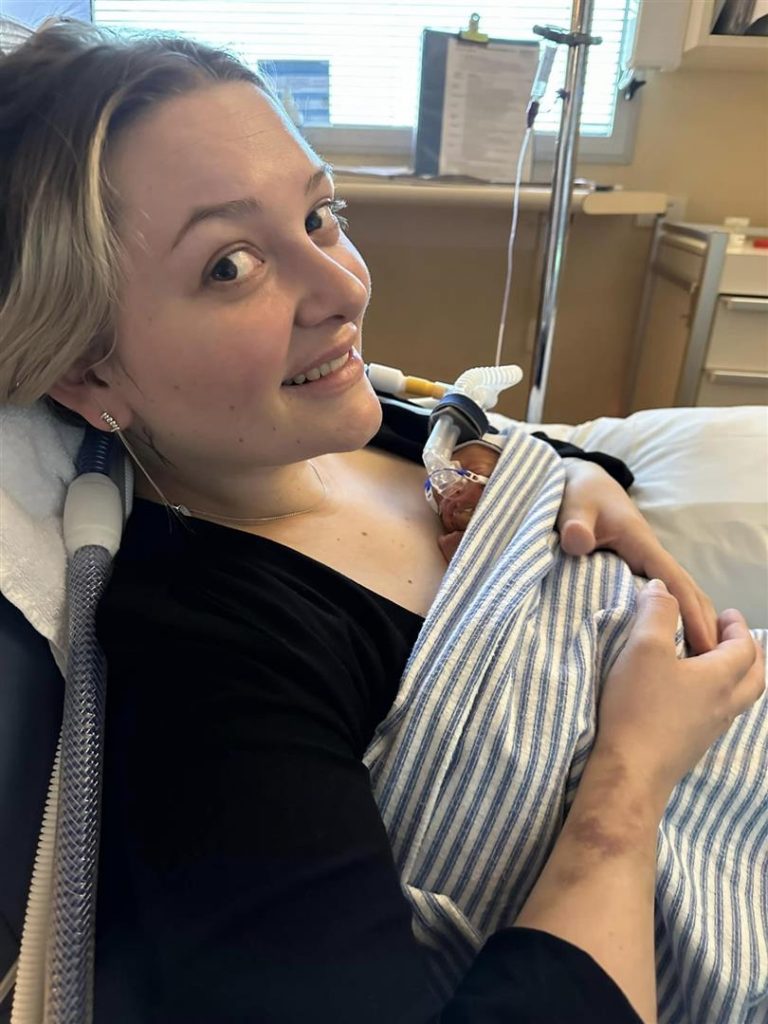
Violet spent 11 weeks in the Christchurch NICU before arriving home with her mum and dad on October 1.
‘‘It was the day I had been thinking of that got me through every other day,’’ Aleisha said.
She said she and Nic were so proud to see Violet growing and thriving daily.
‘‘She puts on weight everyday, she is just like a normal newborn baby now. I just feel so grateful. I cry sometimes when I look at her and she is looking back at me. I am just happy to be home.’’
